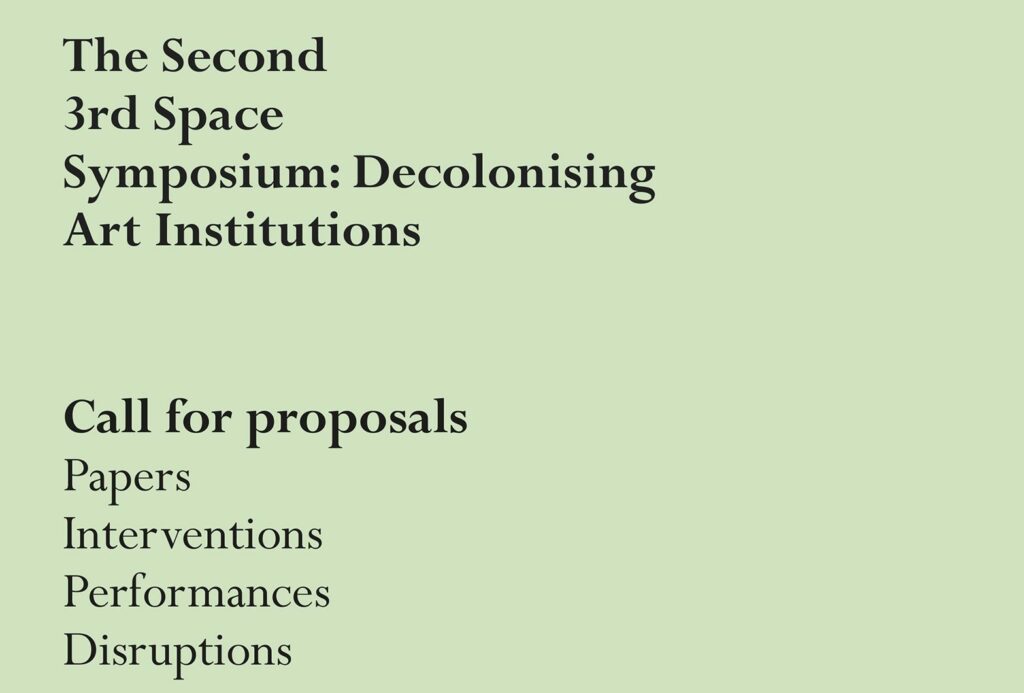University of Cape Town, South Africa
Deadline: 20 April 2017

Proposals, Papers, Interventions, Performances, Disruptions …
… The Institute for Creative Arts’ 3rd Space Symposium is an interdisciplinary event that explores ideas around the imperative to decolonise the university, the role of the creative arts in provoking change, and the dialectic between the settled nature of academic curricula and the spontaneity of transformation.
Comprising colloquia, performances and a publication, this year’s 3rd Space Symposium will take its impetus from the collaboration between three institutions: Zürcher Hochschule der Künste (ZHdK), the University of Cape Town – Institute for Creative Arts (ICA) and Michaelis Galleries, and the University of Witwatersrand – the Wits School of Arts (WSOA).
The 3rd Space Symposium runs from the 8-10 June 2017 at the University of Cape Town’s Hiddingh Campus. The Symposium will be a culminating event coming after symposia being hosted at Wits during March, and in Basel in June.
As a starting point, the title of the Symposium draws from Homi K. Bhabha’s notion of a hybrid “third space” that “displaces the histories that constitute it, and sets up new structures of authority, new political initiatives, which are inadequately understood through received wisdom”[1].
[1] Rutherford, Jonathan. “The Third Space: Interview with Homi Bhabha.” Identity: Community, Culture, Difference. Ed. Jonathan Rutherford. London: Lawrence & Wishart, 1990.
.
Context
The themes for this year’s symposia concern artistic and creative research and how it comes to be represented in the context of museums, art schools, and art institutions around the world – institutions which often appear uniform in their format and content, and which follow Western models. This has given rise to an elite culture that functions prescriptively.
Through a series of symposia, exhibitions, and a publication, we pose a series of conceptual and practical questions that demand a re-examination of functions, forms, curatorial concerns and art practices, and that challenge prevailing conscripts.
Could art institutions work differently by not aligning to a stubborn global institutional culture, and by searching for new formats? What would decolonial art institutions look like? And how might a curatorial approach respond to artists who are committed to exploring alternative forms of knowledge production through their practices? Do existing institutional frameworks have ways of accommodating artistic and epistemological challenges being posed through new forms of art practices?
In a country such as South Africa, the question of knowledge production is crucial to constructions predicated on grand narratives of colonial and/or anti-colonial struggles. This is further complicated by the advent of postmodernist and postcolonial theoretical premises that have rendered the metanarratives of history simplistic and superficially positioned between dominance and subordination and/or resistance. Seen this way, our understanding of decolonization is restricted, which in turn limits the use of the term to struggles for political independence.
Given the long shadow of colonial domination, especially in the field of knowledge production, this multifaceted project brings together players at the forefront of these discussions who are producing knowledge in the present, and who position their output and aspiration “for” and “about” ourselves. The project is also an atlas of the plurality of resistance tactics such as direct action, counterinformation and biological resistance to the academy, its syllabus and firewalls. It should serve as an investigation of the processes through which to address and scrutinize our cultural and academic institutions and how they continue to function.
.
Aim
The symposia and accompanying publication aims to re-imagine the dissemination of knowledge for the rapidly-changing production of visualities and performativities. It enourages sharing the plurality of practices, engagements and concerns across different disciplines, in various geo-political locations and through formalised institutions and alternative forms.
Contributors are encouraged to consider various art forms and academic styles, and to question how institutions have positioned art and art practices. The aim is to address how alternative spaces and strategies have been used to challenge conventions that have become edified or canonized modes of programming, teaching, curating and displaying art works. The publication invites consideration, reflection, and projection (for the future) on how these alternatives are executed, or their potential reimagined.
.
Process
Invited are scholars, writers, and artists to express their ideas for this publication in relation to the themes outlined below. Submissions may be in the form of: a written essay, a photo/graphic essay, or commentary. The call is open to other forms of contributions but encourages a discussion as you work towards your submission.
.
Invited are papers and contributions that explore the following themes:
•Re-examinations of institutional functions, forms, curatorial concerns and art practices
•The social impact of the institution and its culture
•Ways in which current art practices challenge the prevailing praxis of arts institutions
•Decolonising methodologies in the visual and performing arts
•Ways in which creative research processes intersect with politics and politicise practice
•Systemic violence and the violence inherent in curriculum
•The monopoly on art criticism and standards
•A re-imagination of the dissemination of and access to knowledge
•Re-examinations of what constitutes valid knowledge and how knowledge is produced and used
•Critical methodologies in pedagogy and practice in the arts
•The evolution of creative arts education in the humanities
Find the submission form here – http://www.ica.uct.ac.za
.
If you would like your paper to be considered for publication, the full paper must be submitted by 20 April 2017.
Email your submission to: nkule.mabaso@uct.ac.za